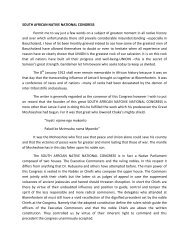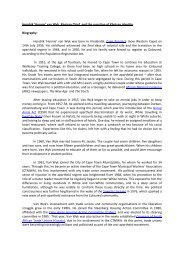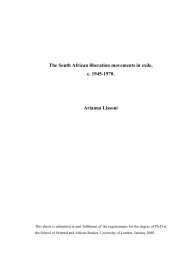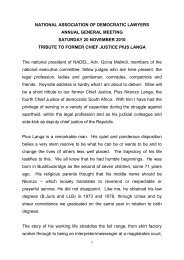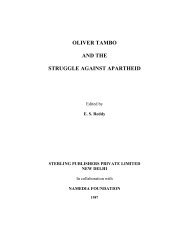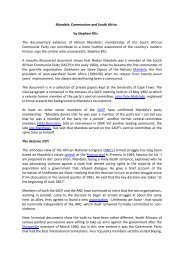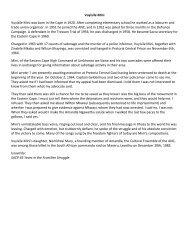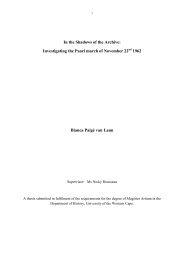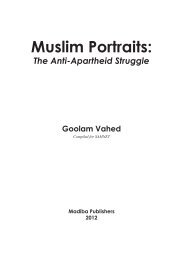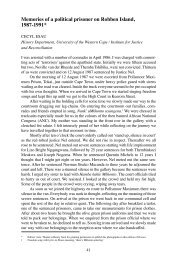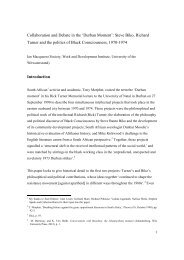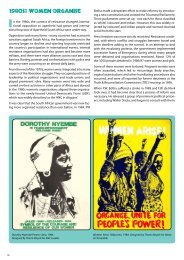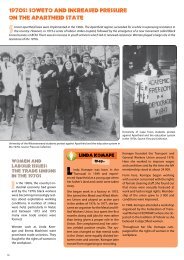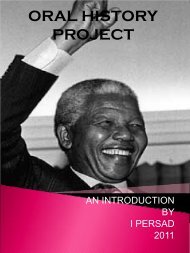Celebrating Women - South African History Online
Celebrating Women - South African History Online
Celebrating Women - South African History Online
You also want an ePaper? Increase the reach of your titles
YUMPU automatically turns print PDFs into web optimized ePapers that Google loves.
The PAC formed an armed wing called Poqo. They are less wellknown<br />
today but also played an important role in <strong>South</strong> <strong>African</strong><br />
history. Robert Sobukwe was the founding president of the Pan<br />
<strong>African</strong>ist Congress. Some of his ideas later inspired Steve Biko and<br />
the Black Consciousness Movement. Sobukwe was put on trial for<br />
his role in the anti-pass campaigns of 1960 and sentenced to three<br />
years in prison in Pretoria. After completing his three-year sentence,<br />
Sobukwe was detained by a special Act of Parliament called the ‘Sobukwe<br />
Clause’, and transferred to Robben Island. He was jailed separately<br />
from the other political prisoners.<br />
In August 1962, Nelson Mandela was captured by the police. In<br />
June 1963, other MK leaders including Walter Sisulu, Govan Mbeki,<br />
Raymond Mhlaba, Dennis Goldberg, and Ahmed Kathrada were arrested<br />
in Rivonia, Johannesburg. They were charged and tried in the<br />
infamous Rivonia Trial. They were sentenced to life imprisonment<br />
in June 1964. The Rivonia Trial had significant short-term and longterm<br />
consequences. The Apartheid government was largely able to<br />
break the strength of the struggle inside <strong>South</strong> Africa by imprisoning<br />
the leaders of MK and Poqo. For a time, open political activity<br />
was nearly impossible.<br />
After the Rivonia Trial and Sobukwe’s arrest, organised resistance to<br />
apartheid within <strong>South</strong> Africa slowed down. Many anti-Apartheid<br />
leaders and supporters were in jail or had gone into exile. And in the<br />
late 1960s Apartheid policies were further tightened by B. J. Vorster,<br />
the Minister of Justice (later the Prime Minister).<br />
Out of this vacuum, the late 1960s gave rise to new sources of resistance,<br />
mainly in the form of the Black Consciousness Movement and<br />
student activism.<br />
detention<br />
laws<br />
In 1963, a law which allowed for 90<br />
days detention without trial was introduced.<br />
Albertina Sisulu was the first<br />
woman to be arrested under this new<br />
law. She was placed in solitary confinement<br />
incommunicado for almost<br />
two months.<br />
In 1965, the 90 day detention period<br />
was increased to 180 days. In 1967,<br />
the Terrorism Act gave the State even<br />
more power to suppress any opposition.<br />
New methods of torture in detention<br />
were also introduced. These<br />
included extended periods of isolation,<br />
standing for long hours, sleep<br />
deprivation, physical assault and psychological<br />
torture. Many women were<br />
victims of torture. But the experiences<br />
of white and black women were different,<br />
as brute force was not generally<br />
used against white women.<br />
Classroom activity<br />
Questions<br />
1. The following list of events is in the incorrect order of time. Refer to the introduction and background sections<br />
and arrange the events in the correct time order. Write the list in your notebook.<br />
• ANC and PAC banned<br />
• <strong>Women</strong>’s March to Pretoria<br />
• Sharpeville Massacre<br />
• Black Consciousness Movement gained momentum<br />
• MK and Poqo formed<br />
• Rivonia Trial<br />
2. With your class, make a list of words that could be used to describe:<br />
a) the Apartheid government<br />
b) those who stood up against the Apartheid government



